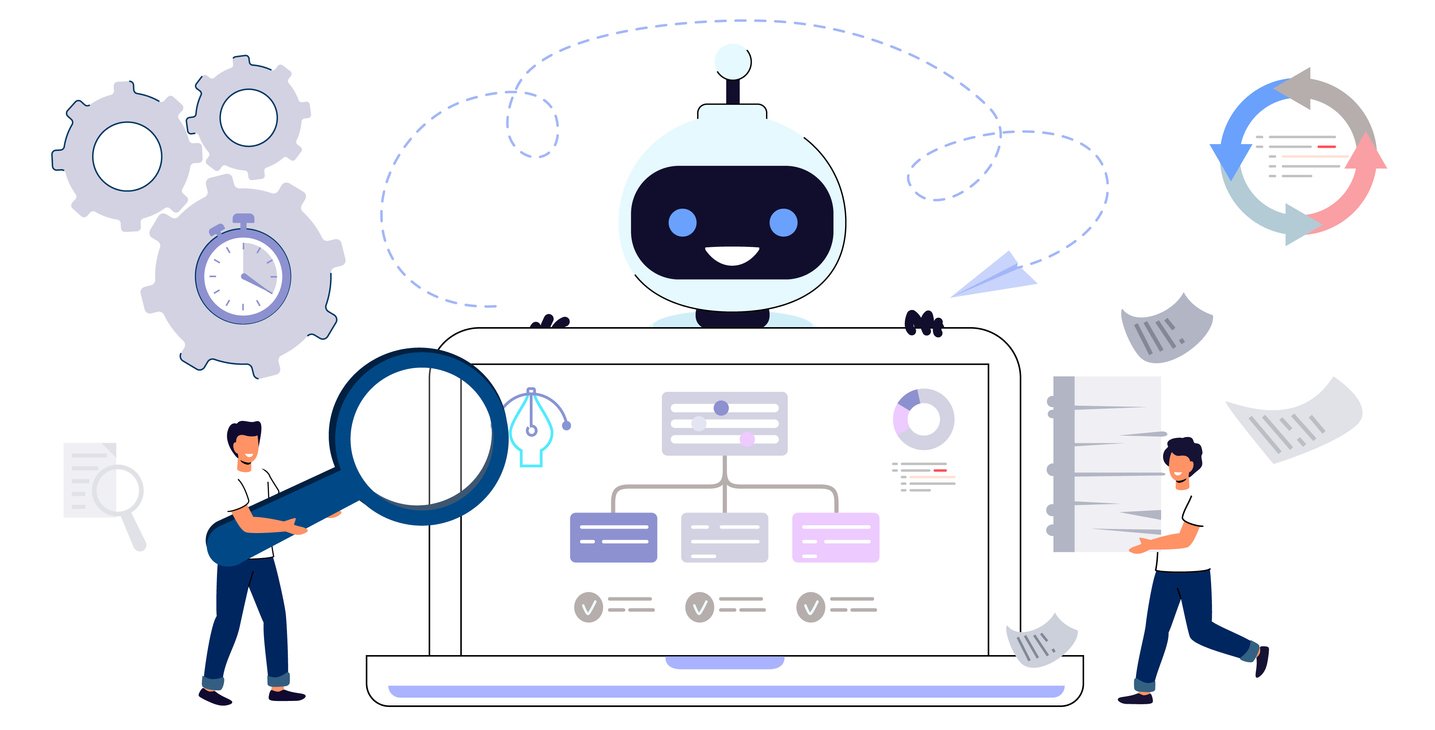
6 Ways to Increase Sales With CRM Marketing Automation
 Updated on
Updated on
 By Bradley Kovacs
By Bradley Kovacs
Bradley Kovacs
Bradley has been passionate about technology since childhood, starting with Microsoft Flight Simulator at age six. In college, he automated his data e...
learn more
Bradley Kovacs
Bradley has been passionate about technology since childhood, starting with Microsoft Flight Simulator at age six. In college, he automated his data e...
Table of Contents
Table of Contents
What would you say is a marketer's best friend?
Is it a hoard of quality customer data stored in a single place (your CRM), to be used to inform campaign decisions and improve targeting?
Or is it marketing automation, that ingenious little invention that allows us to put monotonous and manual activities on rinse and repeat?
How about both?
Integrating these two life-saving technologies (or grabbing a platform that does both) is probably the holy grail of marketing success.
Why?
Well, that's what we're going to discuss right here.
What is CRM Marketing Automation?
Technically speaking, CRM and marketing automation are two different things.
We're going to get into the details shortly, but in a nutshell:
- CRM (customer relationship management) platforms store knowledge about your customers (contact details, previous interactions, purchase history) and help reps manage their sales pipeline
- Marketing automation platforms allow marketers and sales teams to automate activities such as email sends, social media posts, push notifications, and SMS
A CRM with marketing automation is a system that offers both features, allowing revenue teams to draw on data within their CRM to either market directly to existing customers and prospects or to build lookalike audiences on social platforms.
Such platforms are becoming increasingly common as the alignment between sales and marketing becomes ever more important.
CRM vs Marketing Automation

To truly understand how marketing automation and CRM come together to create revenue success, it's important to get a grasp on what the individual tools have to offer.
What is CRM?
CRM stands for customer relationship management, and technically speaking is actually a process or field of business.
Over time, however, the term CRM has grown to be synonymous with that of the CRM platform or software, a tool designed to manage the CRM sales process, which has essentially become the centerpiece of the sales and marketing tech stack.
Hence, when most people talk about CRMs, they're referring to CRM software.
So, what does it do?
CRM's main objective is to improve customer relationships. This rests on the (well-validated) assumption that focusing on developing customer relationships results in improved sales, customer retention, and revenue growth.
Common CRM features include:
- The ability to store customer data such as phone numbers, email addresses, and company structure data
- Communication logs which show when and how your company has engaged with the prospect or customer
- Sales pipeline management
- Reporting and analysis tools
- Integrations for calling, email, and SMS
- Individual sales rep activity tracking
- Sales forecasting capabilities
- Lead scoring functionality
What Are the Differences Between CRM and Marketing Automation Software?
As it turns out, CRM and marketing automation software platforms, though quite different in nature, share a lot of similarities.
Let's quickly summarize the CRM vs marketing automation debate, and then explain in a little more detail just why these two technologies work so well as a team.
|
CRM |
Marketing Automation |
|
The main objective is to store customer data |
The main objective is to automate repetitive tasks |
|
Tends to be used more regularly toward the bottom of the sales funnel (though there are plenty of exceptions) |
Tends to be used more regularly toward the top end of the sales funnel (though there are plenty of exceptions) |
|
Used primarily by sales teams, but also by marketing, customer support, and business analyst teams |
Used primarily by marketing teams, but also by sales, especially in ABM plays |
|
The main benefits are having a single point of truth, a nucleus for your sales tech stack, and improved customer relationships |
The main benefits are time savings, revenue increase, and consistent communication across channels |
What are the Pros and Cons of Each System
CRM systems act as central repositories for customer data, enabling businesses to track interactions, analyze customer behavior, and personalize communication.
Pros:
- Centralized Customer Data: Provides a single source of truth for all customer information, including contact details, purchase history, communication preferences, and support interactions.
- Improved Customer Relationships: Facilitates personalized communication, better customer service, and stronger customer loyalty by understanding individual needs and preferences.
- Streamlined Sales Processes: Automates tasks like lead assignment, contact management, and opportunity tracking, improving sales efficiency and productivity.
- Enhanced Collaboration: Improves communication and collaboration among sales, marketing, and customer service teams by providing a shared view of customer data.
Cons:
- Limited Marketing Capabilities: While some CRM systems offer basic marketing features, they may lack the advanced capabilities of dedicated marketing automation platforms.
- Complexity: Implementing and maintaining a robust CRM system can be complex and time-consuming, requiring significant upfront investment and ongoing maintenance.
- Data Security Concerns: Storing sensitive customer data within a CRM system necessitates robust security measures to prevent data breaches and ensure compliance with data privacy regulations.
On the other hand, marketing Automation platforms leverage data-driven insights to personalize customer journeys and deliver targeted messages at the right time.
Pros:
- Automated Marketing Campaigns: Automates repetitive tasks, such as email campaigns, social media posting, and lead nurturing, freeing up marketing teams to focus on strategic initiatives.
- Personalized Customer Journeys: Delivers targeted messages to the right audience at the right time based on customer behavior and preferences.
- Improved Lead Nurturing: Nurtures leads effectively through automated email sequences, personalized content, and targeted advertising.
- Measurable Results: Provides detailed analytics and reporting on campaign performance, allowing businesses to track key metrics and measure ROI.
Cons:
- Limited Customer Data Management: While marketing automation platforms capture some customer data, they may not provide the same level of customer relationship management capabilities as dedicated CRM systems.
- Integration Challenges: Integrating marketing automation with other business systems, such as CRM and e-commerce platforms, can be complex and time-consuming.
- Dependence on Technology: Reliance on technology can create vulnerabilities if the system malfunctions or faces unexpected downtime.
Key Features of CRM Marketing Automation
CRM marketing automation platforms offer a suite of powerful features that streamline marketing efforts and enhance customer engagement.
By combining the capabilities of a CRM with the power of marketing automation, businesses can achieve a higher level of efficiency and effectiveness in their marketing campaigns.
Here's how:
1. Workflow Automation
Workflow automation eliminates repetitive tasks such as lead scoring, follow-ups, and customer journey mapping. This allows teams to focus on high-value activities, ensuring leads are nurtured effectively and moved seamlessly through the sales funnel.
2. Email Marketing Integration
Email marketing integration within a CRM marketing automation software enables businesses to manage bulk email campaigns effortlessly. These tools allow for personalized messaging that resonates with individual recipients, increasing engagement and conversion rates.
3. Social Media Automation
Schedule and publish posts across various social media platforms, monitor mentions and engage with followers, and track key metrics such as reach, engagement, and website traffic. This feature helps you maintain a consistent social media presence and build stronger relationships with your target audience.
4. Analytics and Reporting
With detailed analytics and reporting capabilities, businesses can measure ROI and track the performance of marketing campaigns. Insights from these reports help refine strategies and allocate resources more effectively.
5. CRM Integration
Seamlessly sync customer data across sales and marketing teams, providing a unified view of customer interactions across all channels. This ensures that everyone has access to the latest information and can personalize communication based on individual customer needs and preferences.
Why CRM and Marketing Automation Go Hand in Hand

You're probably already starting to sniff out that these two technologies seem destined to live together in holy matrimony.
And we're inclined to agree with you, here's why:
1. Because It's All About Communication
Take another look at the functions and benefits of both CRM and marketing automation software platforms, and you'll notice a striking similarity:
It's all about communication with your customers, present, future, and past.
By plugging your CRM and marketing automation tools together, you're simply helping both systems do what they do, but better.
2. Alignment Between Sales and Marketing
Though there is certainly a lot of overlap between these two technologies, the common understanding around use is that CRM is for sales and marketing automation is for marketing (kind of in the name, no?)
If that's the case, then bringing the two platforms together is a surefire way to gain alignment between the two teams as well, at least in terms of data (marketers and salespeople don't always see eye to eye).
Connecting the two by way of integration means both teams are working for the same data set, on the same ground, toward the same goal.
3. Single Point of Truth
Part of that inter-team alignment comes from eliminating the data mismatch.
Here's what I mean:
It's pretty common for marketing teams to take care of lead nurturing at least in the lead's infancy.
This is happily accepted by sales reps, who want to deal only with highly qualified leads (SQLs or sales qualified leads), and not just with anyone who comes into the system (MQLs or marketing qualified leads).
The problem comes in the handoff.
When your teams and systems aren't neatly aligned, you get one or all of these three problems:
- Leads come into the CRM with incomplete data
- Duplicate entries are often created (costing US businesses $3 trillion annually)
- Multiple reps engaged (one might be working on the account already, while marketing nurtures a lead and then hands it off to another)
Integrating CRM with marketing automation = problems solved.
4. More Personalized Customer Communications
One of the criticisms of organizations that are too reliant on marketing automation is that it's a spray and pray approach.
That is, you're sending the same messages out to a bunch of different people, with basically no visibility on who they even are.
When your marketing automation and CRM platforms are working together, marketing has access to all the customer data you have (hopefully it's nice and complete), which they can then use to create personalized messages.
This can be as simple as using the prospect's name in an email send (though that's far from the be-all and end-all of personalization) or segmenting audiences by job title or other firmographic representations.
5. Automation Is a Huge Timesaver
This last point should be enough to convince the most stubborn of anti-adopters:
Marketing automation saves you a tonne of time.
74% of marketers say this is the number one benefit of bringing this tech on board, saving up to 6 hours a week per person.
Integrating these two systems, or simply opting for a CRM with marketing automation built-in in the first place, extends these benefits to your sales team.
Imagine what you could achieve if every single sales rep on your team had an extra 6 hours each week to spend actually selling.
How Can CRM Marketing Automation Help to Increase Sales

We've talked a lot about how CRM and marketing automation are different tools, and how they work really well together.
But what does this mean for the bottom line, and for new sales development?
Let's take a look.
1. Sales Reps Aren't Neglecting Old Leads
Sales managers reading this will know this truth well:
Sales reps don't love nurturing their old leads.
Despite it being well documented that most leads take an average of 8 or more sales calls to close, most reps would prefer to chase down new opportunities than continue to follow up.
This is especially true when that follow up is an email that looks like this:

Not exactly the most entertaining part of a salesperson's day, and so, it just doesn't get done.
By integrating CRM and marketing automation, follow-up messages such as this can be entirely automated.
Sales managers can build out entire email campaigns that run until a prospect responds (for better or worse).
2. More Time to Spend Selling
Here's something sure to set off you growth-obsessed sales managers:
Your reps are only spending about 30% of their time actually selling.
For a rep working an average of 39 hours a week (39 because it's easier to divide by three than 40), that's 13 hours of selling.
You'll recall from our discussion on the benefits of marketing automation platforms that each rep stands to save about 6 hours a week.
If that time goes straight into selling activities, your reps are essentially investing 50% more time each week in selling, and so you stand to gain roughly that in sales volume.
What would it mean to your organization if you could boost sales volume by 50% within a few months?
3. Lead Scoring Helps You Prioritize Responses
One feature offered by the more powerful marketing automation systems is lead scoring.
Here's how it works:
A new lead comes in, and the automation platform ranks it across a number of predetermined (by you) factors, such as:
- Company size
- Sentiment
- Their role
- Whether there is a match between the lead and an ideal account
By implementing lead scoring systems, you're able to prioritize leads, so your reps can jump on the most important opportunities first, and then work their way down the list.
This is super helpful for companies struggling with lead response times, ensuring the most important prospects don't get missed.
4. Easily A/B Test Different Approaches
Remember how in point 1 we discussed how your sales teams could put email or SMS campaigns on repeat and get back to working on those hot leads?
Well, you don't have to just create one campaign and then hope it does what you expect.
Using a marketing automation CRM, sales leaders can create multiple campaigns or email templates, and then A/B test them against each other.
This not only tells you which messaging of the two performs best (so you can use that one going forward) but can inform future communication (by analyzing what the difference is between the two tested messages and making sure to focus on that difference in the future messaging).
5. Put Customer Retention on Rinse and Repeat
Hopefully, this doesn't come as a surprise to you, but growing revenue doesn't just mean generating new sales.
In fact, one of the best ways an organization can grow its revenue year on year is by focusing on customer retention.
Why?
Because it costs 5-10 times as much to get a new customer than to retain an existing one.
So if you're letting your churn rate get out of hand, you're basically burning cash trying to replace those customers, rather than investing a bit in nurturing those relationships, and the rest in growing new sales opportunities.
6. Reduces Sales Cycle Length
This one is super important for B2B sellers, where the sales cycle tends to be excessively long, especially toward the enterprise end of things.
Automated CRM activities such as content distribution and SMS follow-ups can help to reduce the length of your sales cycle, moving customers through the funnel more quickly and accelerating your revenue growth.
Be careful not to take this too far, though. Sending out a new piece of content or follow-up every single day isn't going to take your sales cycle from 3 months to 3 weeks; it's just gonna get you a lot of unsubscribes.
Top 5 CRM Marketing Automation Software
Thinking of skipping the whole integration piece and just going straight in on a marketing automation CRM that does both?
Here are 5 solid choices:
*All pricing details are accurate as of December 2024*
1. Ringy

No list of CRM marketing automation tools would be complete without a bit of shameless self-promotion.
But here's the thing:
Ringy offers a bunch of really powerful automation features, many of which satisfy both marketers and sales reps.
For example:
- Automated email campaigns
- SMS sends and automated drip campaigns
- Powerful reporting and analytics
- Email open, click, and response rates
- Integration with Zapier to connect with the rest of your tech stack
Sound like you? Learn more about Ringy here.
2. ActiveCampaign

ActiveCampaign is typically seen and used as an email marketing automation CRM, but it offers quite an extensive feature set.
Email marketing is definitely a priority, but ActiveCampaign also allows you to automate:
- Full marketing sequences
- SMS sends
- Social media marketing via integration
It's a suitable tool for those who aren't comfortable with super complex interfaces, as it has a nice drag-and-drop automation builder.
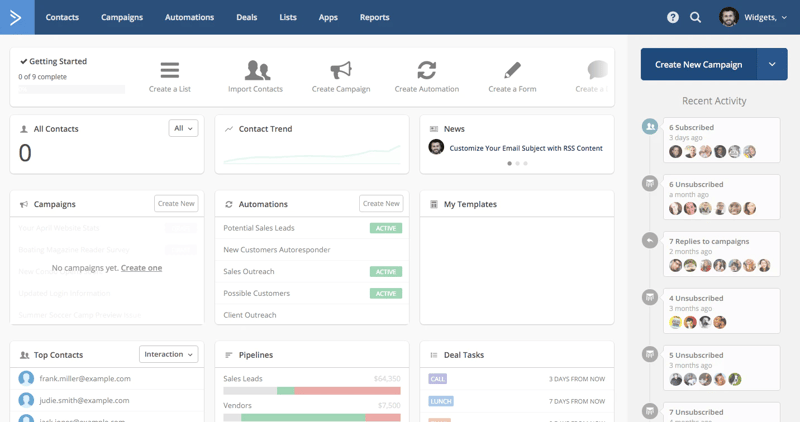
3. HubSpot

HubSpot hardly needs any introduction, they're one of the most widely used CRM marketing automation tools for inbound marketing enthusiasts.
Their service offering can be a little hard to understand, simply because they have so many different packages available, and allow you to customize what you buy by picking out different modules.
What you need to know though is that HubSpot offers email marketing capabilities, a social media management suite, and SMS and text marketing via integration.
In sum, it's a seriously capable CRM marketing automation software, but it can get quite expensive quite quickly.
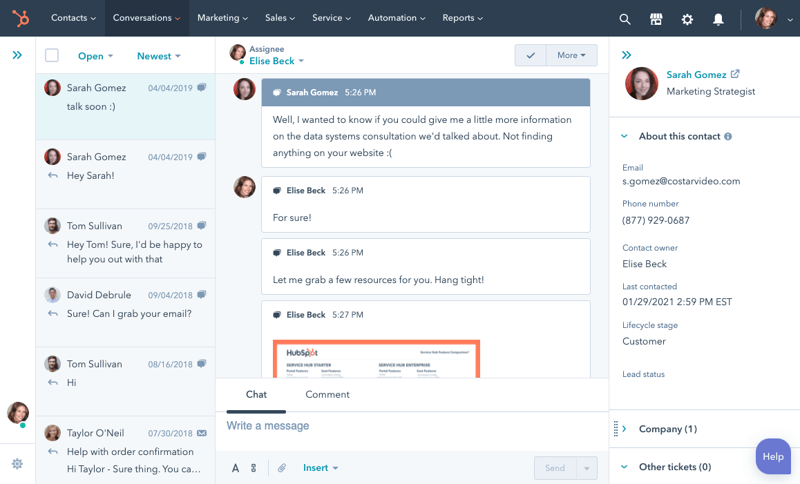
4. AgileCRM
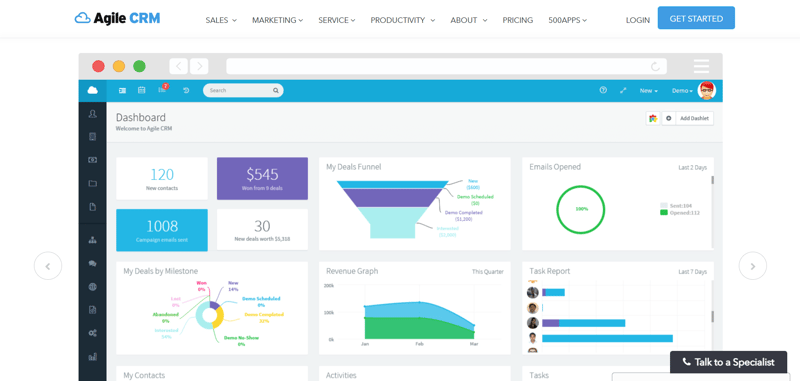
AgileCRM is another CRM marketing automation software that offers more or less all of the standard features you'd be looking for in this category.
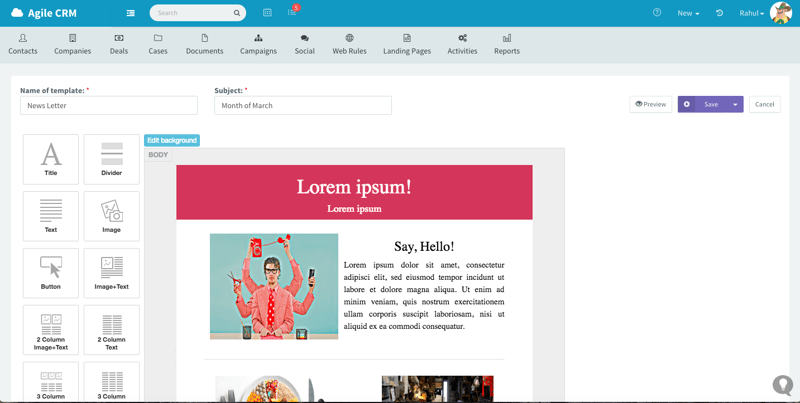
These are some of the features on offer with AgileCRM:
- Video emails
- Email campaigns and tracking
- Multichannel campaigns, including mobile, social, and email
- Website engagement such as landing page creation and website pop-ups
- Free for up to 10 users
5. Zoho

The last of our CRM marketing automation tools is Zoho CRM, one of the myriad tools on offer from software giant Zoho.
Zoho CRM has a giant feature set. It offers standard features like email marketing, as well as impressive segmentation tools and sales intelligence features.
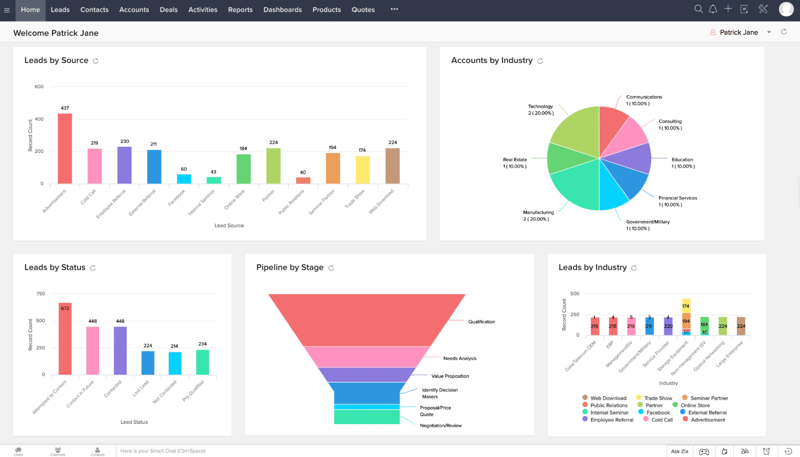
SMS messaging is available by way of integration with ClickSend or Twilio, but social media marketing automation is native.
CRM Marketing Automation Software Comparison
*All pricing details are accurate as of December 2024*
|
Ringy |
ActiveCampaign |
HubSpot |
AgileCRM |
Zoho CRM |
|
|
Yes |
Yes |
Yes |
Yes |
Yes |
|
|
SMS automation |
Yes |
Yes |
Via integration |
Yes |
Via integration |
|
Social media automation |
No |
Via integration |
Yes |
Yes |
Yes |
|
Primary function |
CRM |
Email marketing |
Inbound marketing management |
CRM |
CRM |
|
Pricing |
$109 per month |
Starts at $15 per month |
Starts at $20/user per month |
Starts at $79.99/user per month |
Starts at $18/user per month |
Conclusion

Let's quickly summarize what we've covered here today:
- Marketing automation and CRM are not the same things
- The two systems are typically integrated, however, and some CRMs offer marketing automation features
- There are a number of benefits to having both tools work together in harmony, all of which contribute to increased sales and revenue
- Modern sales teams use both CRM and marketing automation platforms to create holistic sales processes and personalized customer experiences by leveraging their data and the powerful capabilities of marketing automation software
So, now you've got a choice to make:
Whether to work with two separate tools and wrangle them together or simply use a CRM with marketing automation features built right in?
If that latter sounds like a good fit for your company, book a demo with one of the Ringy team, and we'll show you just how you can accelerate your sales efforts with effective automation.

Skyrocket your sales with the CRM that does it all.
Calling? Check. SMS? Check. Automation and AI? Check. Effortlessly keep in touch with your customers and boost your revenue without limits.

Take your sales to new heights with Ringy.
Sales in a slump? Ringy gives you the tools and flexibility you need to capture leads, engage with them, and turn them into customers.
Subscribe to Our Blog
Enter your email to get the latest updates sent straight to your inbox!
Categories
Related Articles





















































